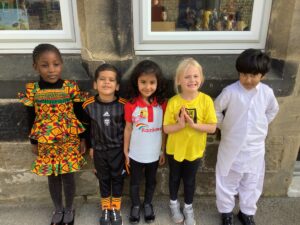A few reminders!
Firstly, we are now into our second week of group reading, so here are the chapters you need to read up to:
- Kensuke’s Kingdom – up to chapter 5
- The boy and the tiger – up to chapter 5
- Flood and Fang – up to chapter 6
- Alone on a wide, wide sea – up to chapter 7
- Street child – up to chapter 8
- Divine Freaks – up to chapter 6
Secondly, with our class assembly quickly approaching (Wednesday 16th November) please remember to practise your speaking parts and refresh your memory by watching the YouTube video of the song we will be singing.
https://www.youtube.com/embed/CMs_IGKxMu0
Finally, Anti-bullying day is on Monday 14th November so please remember to wear odd socks!
Science – Looking for signs of Autumn
Today in science we recapped our learning so far about the seasons. We thought about what changes happen in different seasons and the order of the seasons. Then we went outside to investigate which season it is right now. We took out the iPads and had to find evidence as to what season it is.
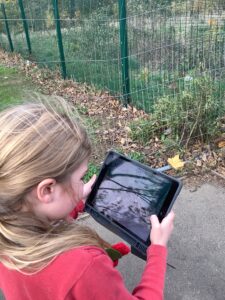
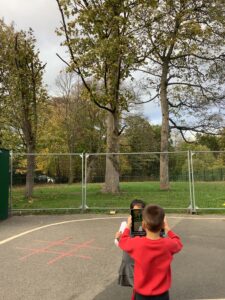
We found lots of evidence that the season was Autumn! Fallen leaves, leaves changing colour and lots of wind!! Here are some of the photos the children took. Well done everyone!


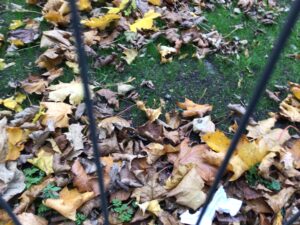

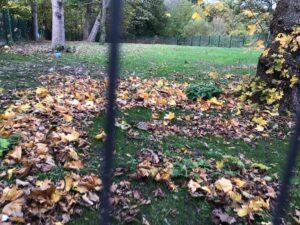

What have we been up to this week?
Literacy
This week, we’ve been reading Night Monkey, Day Monkey by Julia Donaldson. This led us onto talking about nocturnal and diurnal animals. Ask your child if they can remember what they mean and if they can give you an example of a nocturnal and diurnal animal.
For our writing activity, we drew a picture of the monkeys and things they saw when they were awake. Some children came up with our own ideas!
 Phonics
Phonics
This week, we learnt four more graphemes: v, w, x, y. The children are really enjoying their daily phonics sessions and are becoming super readers! This week, we’ve noticed lots of children using their phonics skills when labelling their Day Monkey and Night Monkey pictures.
Writing process
In phonics, we’ve started to write captions, e.g. a red sock.
To help us with the process, we follow six simple steps.
1. Think about what we want to write.

2. Say it out loud.
 3. Count the words.
3. Count the words.

4. Segment each word on our phoneme fingers.

5. Write each word.

6. Check our writing makes sense.

Maths
This week, we’ve been comparing the number of objects in two sets by matching them 1:1. When comparing, we noticed that some sets had more than, fewer than and an equal number. On Tuesday and Wednesday, the Three Bears needed our help to make sure they had packed an equal number of things for their picnic.
They have one plate each.
They have an equal number for forks.
It’s not equal because Daddy Bear has two bananas, Baby Bear has one and Mummy Bear has none.
We need to take one banana from Daddy Bear and give it to Mummy bear.
They all have one sun hat.
We continued our comparison learning in the maths area. We explored comparing two Numicon pieces and tried to make the scales equal.
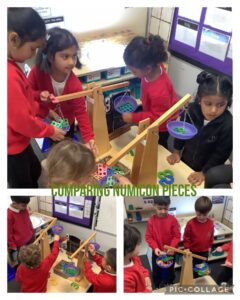
Here are some more highlights from this week…

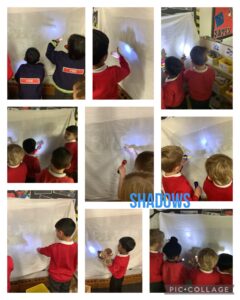


Click here to watch this week’s poem.
Reminders
- Please make sure your child returns their reading record book every Thursday.
- Next week is Anti-Bullying week. To kick off the week, we’re taking part in Odd Socks Day. Children can come to school on Monday wearing odd socks!
- It’s also Nursery Rhyme week. All week we’ll be learning about different nursery rhymes.
- Thank you to everyone who has signed up to one of the Marvellous Maths stay & learn sessions next Wednesday & Thursday. We look forward to welcoming you back into the classroom.
- Next Friday is Children in Need. Your child can come to school in non-uniform.
Home-Link Challenge

Living and Learning: ‘Me and My Community’ week
Last week, MPS had their first themed week of the year – me and my community. Year 3 had a busy week and learnt lots about different communities. Here’s just some of what we got up to!
We were lucky enough to start out week with a visit to St Gemma’s Hospice. The children learnt about the amazing service that is provided at the hospice and how we can do our bit to help. St Gemma’s has since been voted as our school charity for this year!

We had a visit from Linda Gledhill who spoke to the class about hearing impairments. We also learnt how to say our name in British Sign Language.
We also had a visit from the Royal National Institute of Blind People. We tried on glasses to see what it would be like to be blind.

Me and My Community Week!
Last week in school, we had a themed week. The theme was:
Me and My Community
The week saw us enjoy a whole host of different tasks, activities and fun things to do with our community!
On Tuesday, we went to Allerton Grange High School and enjoyed a drama session where we role played showcasing the things we love about Moortown Primary School.
On Wednesday, we had a visitor come and talk to us and raise our awareness of the visually impaired.
On Thursday, we had visitors from the LGBTQ+ community come and talk to us about their community.
On Friday, we had the Leeds United Football Foundation come and talk to us about diversity, equality and inclusion. Then, in the afternoon, West Yorkshire Police came and talked to us about hate crimes.
A very important, jam-packed week for everyone! Well done, Y6!
Felix dies tibi sit! Happy birthday to you!
Salvette Omnes! (Hello Everyone!)
In today’s Latin lesson, we learnt about a birthday invitation that was sent during the Roman period in Britain.
After that, we read a passage about the birthday party and translated it from Latin to English. Using our Latin pronunciation skills, we took the roles of the different characters and role played the birthday party!



Coincidentally, we had a birthday in our class so we were able to sing happy birthday to them in Latin!
Felix dies tibi sit
Felix dies tibi sit
Felix dies care (m) cara (f) _______
Felix dies tibi sit
Great learning, Y6!
Junior leaders
Today, our new junior leaders met for the first time.
As part of the meeting, they reviewed our school definition of bullying and our child friendly anti-bullying policy prior to anti-bullying day next Monday.

They also reminded the class about Odd Socks Day, which is also on Monday, that celebrates our individuality.

Living and Learning: Me and my community
Everyday this day week, we have been focusing on our community and that of others. We have had lots of visitors from a wide range of communities: the visually impaired, LGBTQ+ and a representative of the police force (just to name a few).
The highlight of the week was Friday, when we all dressed in our ‘identity’ clothes. It was wonderful to see that our Moortown community is made up of so many unique individuals.

‘Me and My Community’ week!
What a week!
The first week back after half term has been a busy one with it being ‘Me and My Community’ week. This week the children were immersed in lots of activities that taught them about many different communities. Here’s just some of what we got up to!
We began with a visit from a visually impaired man, Sid and his guide dog, Jamie. It was so eye-opening for the children to see and learn how people with visual impairments live their lives to the fullest with the help of others and their dogs.
We then had visitors who were teaching the children about LGBTQ+, what it means and how we can support anyone who needs it. Year 4 really understood the importance of the information!
Linda Gledhill did a talk with the children about hearing impairments. In this session, the children learnt what they can do to help deaf or partially deaf people understand. For example, they should look directly at the person, do not over pronounciate and use hand signals if you can (sign language).
Finally, through the week, Year 4 were chosen to venture out into Moortown Park to do litter picking! Unfortunately, they found lots of litter but I’m sure the people of Moortown will be very thankful. Here’s some photos of the children in action. 


Living and Learning: Me and my community week
This week has been very busy in Year 1! We have been working all week learning about our identity and our community!

On Tuesday two Police Community Support Officers came into the classroom to talk to us about staying safe using fireworks and sparklers. We listened really well and even found out you should put your sparkler in a carrot!!

On Wednesday, as well as our amazing class assembly (Well done everyone!), we also had a visit from the RNIB. They brought along a guide dog with them and we learnt all about the job of a guide dog.

On Thursday, teacher for the deaf came to visit to talk to us all about how we can help deaf adults and children understand us more clearly. We learn some sign language too.

We have had an amazing week learning all about how we are the same and how we are different. It has all been topped off by everyone showing off their identity today! Amazing work everyone!
